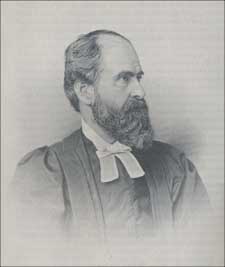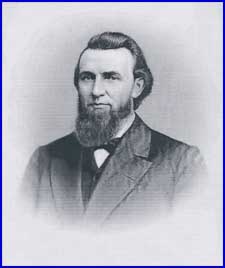 Henry Jackson Van Dyke, Sr., was born in Abington, Pennsylvania, 2 March 1822. He was educated at the University of Pennsylvania, graduating there in 1843 and later graduating from Princeton Theological Seminary in 1846. He was ordained by the Third Presbytery of Philadelphia in June of 1845 and installed as pastor of the Second Presbyterian Church at Bridgeton, New Jersey, where he served from 1845-1852. He was next called to pastor the First Presbyterian Church of Germantown, PA, but only served there briefly, 1852-1853. His his final and longest pastorate was at the First Presbyterian Church (Later renamed the Second Presbyterian Church, following a merger) of Brooklyn, New York, 1853-1891. He died in Brooklyn on 25 May 1891. Honors conferred during his life included the Doctor of Divinity degree, awarded by Westminster College of Fulton, Missouri, 1865. In 1876, he served as Moderator of the 88th General Assembly of the PCUSA, as it met in Brooklyn, NY, just seven years after the reunion of the Old School and New School divisions of that denomination. Rev. Van Dyke was survived by his wife, Henrietta Ashmead Van Dyke [1820-1893]. Their marriage produced two sons, Henry Jackson Van Dyke, Jr. [1852-1933], who later became a noted author and poet; and Paul Van Dyke [1859-1933]. Paul was a Presbyterian minister at Geneva, NY, 1887–89, and then taught church history at Princeton Theological Seminary, 1889–92.
Henry Jackson Van Dyke, Sr., was born in Abington, Pennsylvania, 2 March 1822. He was educated at the University of Pennsylvania, graduating there in 1843 and later graduating from Princeton Theological Seminary in 1846. He was ordained by the Third Presbytery of Philadelphia in June of 1845 and installed as pastor of the Second Presbyterian Church at Bridgeton, New Jersey, where he served from 1845-1852. He was next called to pastor the First Presbyterian Church of Germantown, PA, but only served there briefly, 1852-1853. His his final and longest pastorate was at the First Presbyterian Church (Later renamed the Second Presbyterian Church, following a merger) of Brooklyn, New York, 1853-1891. He died in Brooklyn on 25 May 1891. Honors conferred during his life included the Doctor of Divinity degree, awarded by Westminster College of Fulton, Missouri, 1865. In 1876, he served as Moderator of the 88th General Assembly of the PCUSA, as it met in Brooklyn, NY, just seven years after the reunion of the Old School and New School divisions of that denomination. Rev. Van Dyke was survived by his wife, Henrietta Ashmead Van Dyke [1820-1893]. Their marriage produced two sons, Henry Jackson Van Dyke, Jr. [1852-1933], who later became a noted author and poet; and Paul Van Dyke [1859-1933]. Paul was a Presbyterian minister at Geneva, NY, 1887–89, and then taught church history at Princeton Theological Seminary, 1889–92.
The Special Collections Department at Princeton University houses the Van Dyke Family collection, which include materials by Henry Jackson Van Dyke, Sr. His papers include manuscripts of sermons (1844-1891), essays, speeches, Bible lessons, and theological notes. The correspondence subseries contains many letters to Van Dyke from clergymen, parishioners, friends, and family, often regarding the controversy caused by his publication of The Character and Influence of Abolitionism, the Reunion movement in the Church, and matters of the General Assembly. Men such as N. C. Burt, Howard Crosby, Cyrus Dickson, William H. Green, James O. Murray, E. D. Prime, and Nathaniel West are representative of Van Dyke’s correspondents. Searches on the Web tend almost entirely to only produce results dealing with his son, a well known author and poet of his era, who was theologically a moderate liberal. The question occurs of course, did the father’s errors push the son to react with yet more error. Would that both had instead listened to Rev. Sloane (see below) and repented of their sins.
It was on this day. December 9, 1860, that Rev. Henry J. Van Dyke delivered his discourse on “The Character and Influence of Abolitionism.”
He set forth four main points in his argument to undermine the abolitionist cause:
“Abolitionism has no foundation in the Scriptures.
Its principles have been promulgated by misrepresentation and abuse.
It leads, in multitudes of cases, and by a logical process, to utter infidelity.
It is the chief cause of the strife that agitates and the danger that threatens our country.”
Read Van Dyke’s discourse online here (HathiTrust) – http://catalog.hathitrust.org/Record/009565957
or download here (Archives.org) – https://archive.org/details/characterinfluen07vand.
That work and some of his other works can also be found on a page set up under his name, over at the Log College Press web site
 By all means then you must also read the review written by James Renwick Willson Sloane [1823-1886], a Reformed Presbyterian pastor and contemporary of Rev. Van Dyke. See the link below, or again, visit the page listing Rev. Sloane’s works, at the Log College Press.
By all means then you must also read the review written by James Renwick Willson Sloane [1823-1886], a Reformed Presbyterian pastor and contemporary of Rev. Van Dyke. See the link below, or again, visit the page listing Rev. Sloane’s works, at the Log College Press.
Please be aware there is also an uplifting biography of Rev. Sloane that you should read, for he was a stalwart defender of Scriptural truth even in the face of determined opposition.
Words to Live By:
Rev. Sloane was quite right to call out Henry Van Dyke for the error of what he was teaching. Apparently it is all too easy to get caught up in the prevailing culture and even Christians can be found living without a Biblical discernment on some matters. May our Lord give us discernment and conviction to repent of the sins of our time and culture. Better still, to mourn over the sins of our times. It is easy to condemn the sins of an earlier time; what are we doing to oppose the sins of today?
